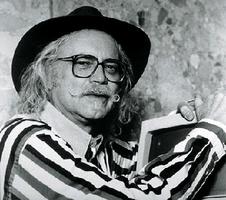
William Patrick (W.P.) Kinsella, OC, OBC, writer (born 25 May 1935 in Edmonton, AB; died 16 September 2016 in Hope, BC). W.P. Kinsella spent his early childhood on an isolated farm near Darwell, Alberta. His family moved to Edmonton when he was 10 years old, where he attended school for the first time. Kinsella completed a Bachelor of Arts at the University of Victoria and a Master of Fine Arts at the University of Iowa. He taught in the English Department at the University of Calgary from 1978 to 1983. W.P. Kinsella was a prolific writer from 1977 until 1997, when he suffered a head injury after being struck by a car. He is well known for both his baseball stories and his humourous fiction set on the Ermineskin Reserve.
In his stories and novels, W.P. Kinsella created 2 disparate fictional universes. The first, set largely on the Hobbema Reserve in central Alberta, focuses sympathetically on the lives of Indigenous people in their perennial skirmishes with blundering white institutions and bureaucracies. Dance Me Outside (1977) was the first of Kinsella's several story collections set in Hobbema and narrated by Silas Ermineskin. It was made into a film of the same name in 1994, directed by Bruce McDonald, and was the basis for the CBC television series The Rez. Later titles in Kinsella's Hobbema series include The Fencepost Chronicles, which won the 1987 Stephen Leacock Medal, Brother Frank's Gospel Hour (1994), and The Secret of the Northern Lights (1998).
Kinsella's Hobbema stories met with controversy from some critics who objected to Kinsella's appropriation of Indigenous voice and what they saw as stereotype-based humour. Kinsella defends writers' freedom to create fiction about any subject. He states, "It's the oppressed and the oppressor that I write about. The way that oppressed people survive is by making fun of the people who oppress them. That is essentially what my Indian stories are all about."
W.P. Kinsella's second fictional landscape — which won him an international audience — is the world of baseball, a world often leavened with a touch of the surreal, the magical or the fantastic. The compelling and imaginative novel Shoeless Joe (1982), which won both the Houghton Mifflin Literary Fellowship and the Books in Canada Award for First Novel, is the best known of his baseball fictions. It was adapted for film as Field of Dreams (1989), which popularized the phrase, "If you build it, he will come." Among his other baseball works are The Iowa Baseball Confederacy (1985), Magic Time (1998), and Japanese Baseball and Other Stories (2000). Kinsella edited Diamonds Forever: Reflections from the Field, the Dugout & the Bleachers (1997) and co-wrote the Japanese non-fiction book Ichiro Dreams: Ichiro Suzuki and the Seattle Mariners (2002).
Although his 1997 accident had a devastating impact on his creative output, W.P. Kinsella continued to write non-fiction and to contribute to Canadian literature. From 2001 to 2006 he served as the preliminary judge of the Chapters/Books in Canada First Novel Contest. He was awarded a number of honorary doctorates and was made an Officer of the Order of Canada and a member of the Order of British Columbia.

 Share on Facebook
Share on Facebook Share on X
Share on X Share by Email
Share by Email Share on Google Classroom
Share on Google Classroom

